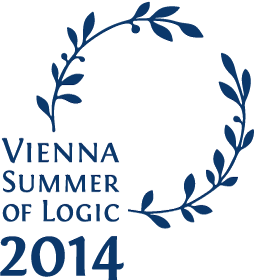Organizers
Matthias Baaz studied mathematical logic, mathematics and astronomy at the University of Vienna. In 1992, he attained “Habilitation” with his thesis concerning the logical foundations of computer science. His scientific interests mainly concern proof theory, Gödel logics, and juridical logics. He is currently an associate professor and head of the research group for computational logic at the Institute of Discrete Mathematics and Geometry at the Vienna University of Technology.
Thomas Eiter is a professor of knowledge-based systems and Head of the Institute of Information Systems, which is part of the Faculty of Informatics at Vienna University of Technology. He has worked extensively on logic-based databases and artificial intelligence; his current research interests include knowledge representation and reasoning, computational logic, foundations of information systems, and computational complexity in artificial intelligence.
Helmut Veith is a professor of Computer Science at Vienna University of Technology, Austria, and an Adjunct Professor at Carnegie Mellon University, Pittsburgh. Prior to his appointment in Vienna, he had professor positions at TU Darmstadt and TU Munich. He is the speaker of the Doctoral College “Logical Methods in Computer Science”, vice-speaker of the Austrian research network “Rigorous Systems Engineering”, a coeditor of the forthcoming Handbook of Model Checking, and program chair of CAV, FMCAD, CSL and LPAR. He has numerous research publications in computer-aided verification, software engineering, computer security, and logic in computer science.
Vienna Summer of Logic speakers
Franz Baader is full professor for Theoretical Computer Science at TU Dresden, Germany. He has obtained his PhD in Computer Science at the University of Erlangen, Germany. He was senior researcher at the German Research Institute for Artificial Intelligence (DFKI) for four years, and associate professor at RWTH Aachen for eight years. His main research area is Logic in Computer Science, in particular knowledge representation (description logics, modal logics, nonmonotonic logics) and automated deduction (term rewriting, unification theory, combination of decision procedures). Franz Baader is an ECCAI Fellow since 2004 and a member of the Academia Europea since 2011.
Edmund M. Clarke is the FORE Systems University Professor of Computer Science at Carnegie Mellon University. He received his Ph.D. from Cornell University and taught at Duke and Harvard Universities before joining CMU in 1982. His research interests include hardware and software verification and automatic theorem proving. In particular, his research group developed Symbolic Model Checking using BDDs, Bounded Model Checking using fast CNF satisfiability solvers, and pioneered the use of CounterExample-Guided-Abstraction-Refinement (CEGAR). He is a co-founder of the conference on Computer Aided Verification (CAV). He has received numerous awards for his contributions to formal verification of hardware and software correctness, including the IEEE Goode Award, the ACM Kanellakis Award , the ACM Turing Award, and the CADE Herbrand Award. Dr. Clarke is a member of the National Academy of Engineering and the American Academy of Arts and Sciences. Most recently he received the 2014 Franklin Institute Bower Award and Prize for Achievement in Science for verification of computer systems.
Christos H. Papadimitriou is the C. Lester Hogan Professor of Computer Science at UC Berkeley. Before joining Berkeley in 1996 he taught at Harvard, MIT, Athens Polytechnic, Stanford, and UCSD. He has written five textbooks and many articles on algorithms and complexity, and their applications to optimization, databases, AI, economics, and the Internet. He holds a PhD from Princeton, and seven honorary doctorates. He is a member of the Academy of Sciences of the US, the American Academy of Arts and Sciences, and the National Academy of Engineering, and a fellow of the ACM. He has also written the novels “Turing”, “Logicomix” (with Apostolos Doxiadis) and “Independence” (in Greek).
Dana S. Scott received a B.A. degree in mathematics from the University of California, Berkeley, in 1954 and his PhD from Princeton University in 1958. He taught at various universities, including the University of Chicago, University of California, Berkeley, Stanford University and Oxford University. In 1981, he became University Professor of Computer Science, Mathematical Logic and Philosophy at Carnegie Mellon University. Together with Michael Rabin, Dana Scott received the 1976 Association for Computing Machinery A.M. Turing Award.
Alex Wilkie, FRS is a mathematician known for his contributions to Model theory and logic . Previously professor of mathematics at the University of Oxford , he was appointed to the Fielden Chair of Pure Mathematics at the University of Manchester in 2007. Wilkie gained his PhD from the University of London in 1973 under the supervision of Wilfrid Hodges with a dissertation entitled Models of Number Theory . He was elected a Fellow of the Royal Society in 2001.
Federated Logic Conference plenary speakers
Véronique Cortier is research director at CNRS, Loria, France. She has been granted two awards in 2004 for her PhD and she has been recently awarded an ERC starting grant. She is working on the automatic verification of security protocols, using formal models such as first order logic or rewriting.
Orna Kupferman is a computer science professor at The Hebrew University. Orna’s research focuses on the theoretical aspects of system specification, verification, and synthesis.

